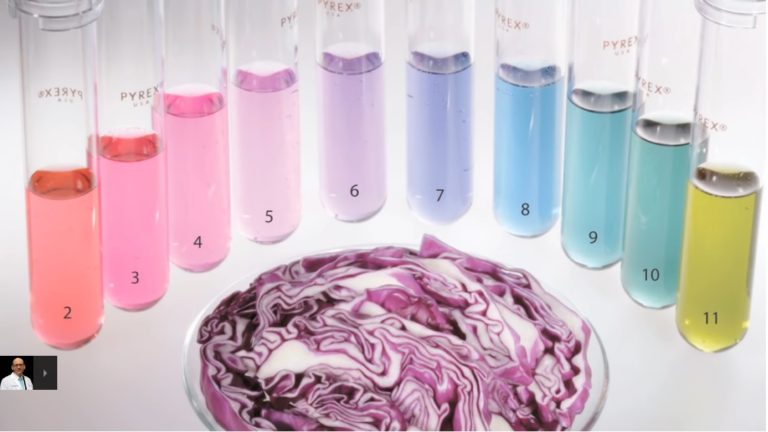
Surely dates taste far too nice to be good for us! Isn’t there a catch? Well, it appears research is pretty clear about whether or not eating seven dates a day is a healthy option. We’ll look specifically at whether such a sweet addition to the daily diet helps to protect against colon cancer. In addition, some other surprising potential benefits will also come under scrutiny.
Blog Contents
Antioxidant content of sweeteners
Compared with other sweeteners, date sugar (a powder made simply from powdered dried dates) has the most antioxidants, as shown in the following chart 1 :
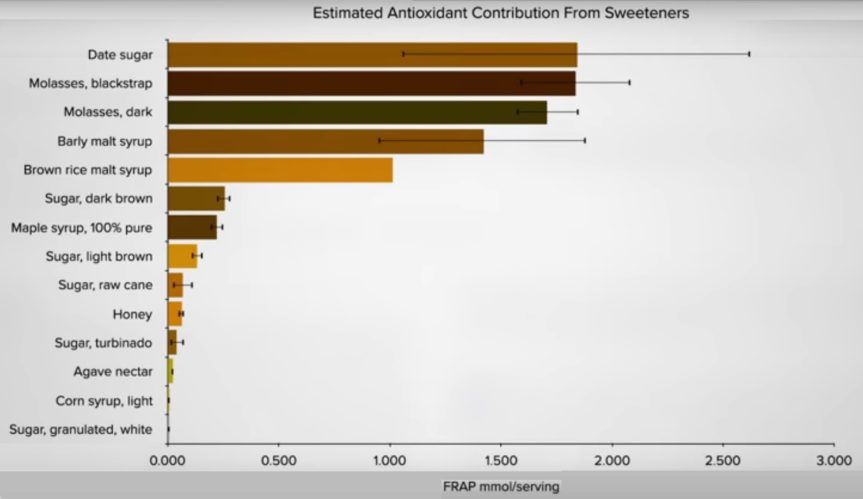
Other health claims for dates
One study 2 makes pretty wide claims about the benefits of dates for a whole range of diseases – although the research was based largely on experiments with rats:
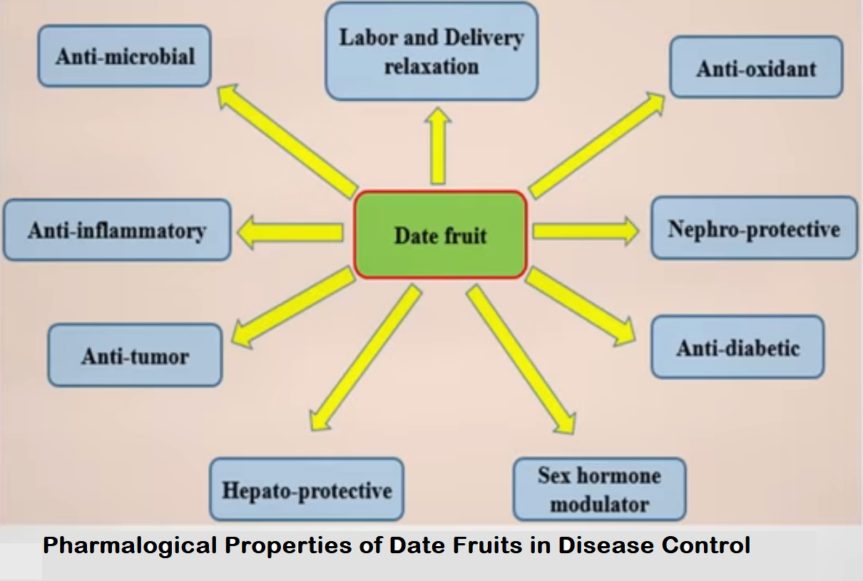
Although there needs to be more research regarding several of the above claims before drawing final conclusions, there are at least two of the benefits mentioned for which there’s support from some compelling studies – namely, aiding relaxation during labour and delivery 3 4 5 6 7 and possessing an anti-tumour effect . Dr Greger has a couple of videos on the former (i.e. dates and pregnancy) 8 9 , if you’re interested. However, our main focus here is on the anti-tumour (anti-cancer) effects, particularly with regard to the colon.
Dates & the colon
Although this sounds like some 70’s Punk Band, dates seem to be seriously beneficial for the colon.
In several earlier blogs 10 11 12 13 , we looked at health issues related to the bacteria in our guts (variously referred to as ‘gut flora‘, ‘gut microbiome‘ or ‘gut microbiota‘ – technically, ‘microbiota’ refers to the microbes found in a specific environment, while ‘microbiome’ is the whole collection of microbial genomes in that environment. In any case, the billions of bacteria living inside us seem to have astonishingly diverse and far-reaching influences on every aspect of human health – from psoriasis and MS to depression and fibromyalgia.
Central to the ability of the microbiota to do their best work for us, is the type of foods we consume – with prebiotics, such as fibre and polyphenols (a type of antioxidant phytonutrient), being really important to get the best out of these little chaps (and chapesses?). And, weirdly inappropriate gender allusion aside, it just so happens that dates contain lots of these prebiotics.
Dates in vitro
Research 14 has shown the ability of dates (at least, in these in vitro tests), not only to increase the amount of ‘good’ bacteria, but also to kill off colon cancer cells. The researchers concluded: “…consumption of date fruits may enhance colon health by increasing beneficial bacterial growth and inhibiting the proliferation of colon cancer cells. This is an early suggestion that date intake by humans may aid in the maintenance of bowel health and even the reduction of colorectal cancer development.”
Dates in vivo
Of course, the latter were in vitro and not in vivo tests – that is, in a petri dish rather than in a dishy Peter (or Polly, for that matter). However, a subsequent randomised, controlled, cross-over, intervention study 15 , which looked for similar effects in actual human beings, found that consumption of seven dates for three weeks:
1. Significantly increases bowel movements and stool frequency
The additional fibre will play a big part here. Having regular (and easy!) bowel movements is, of course, a strong sign of good bowel health – helping to prevent constipation, diverticulosis (which can develop into diverticulitis), hiatal hernias, heartburn, GERD, etc. When eating a high fibre diet, two or three healthy bowel movements each day are quite normal. With enough fibre in the stool, you should be able to sit in any position and have a comfortable bowel movement 16 .
In terms of long-term ‘uncomfortable’ or infrequent bowel movements and the development of colon cancer, one study concludes: “Constipation was associated with a moderately increased risk of colorectal cancer.” 17 , while another study concludes: “Patients with chronic constipation are associated with significantly higher prevalence and incidence of colorectal cancer and benign colorectal neoplasm than matched chronic constipation‐free patients. These risks increase with the severity of chronic constipation.” 18 .
Now, there is some debate about whether there’s a causal link between chronic constipation and colon cancer (also referred to as colorectal cancer or CRC, which covers the rectum as well as the colon). But why take the chance?
2. Significantly reduces stool ammonia concentration
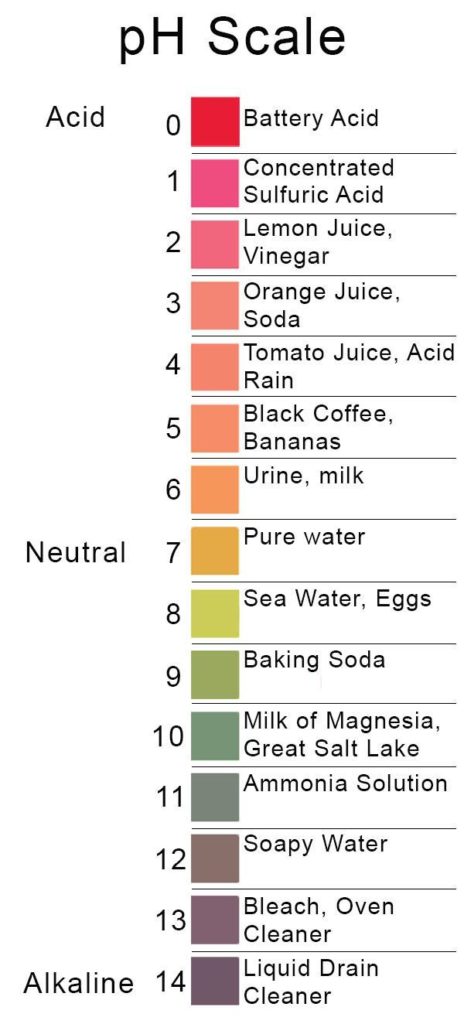 So what? Isn’t ammonia an alkaline? And previous blogs 19 20 have encouraged us to eat a more alkaline diet, even suggesting we use a litmus paper test to ensure we produce alkaline urine. So why wouldn’t it be a good thing to have alkaline poo?
So what? Isn’t ammonia an alkaline? And previous blogs 19 20 have encouraged us to eat a more alkaline diet, even suggesting we use a litmus paper test to ensure we produce alkaline urine. So why wouldn’t it be a good thing to have alkaline poo?
Well, in overly simplistic terms, alkaline urine is good and alkaline poo is bad.
Back in 1981, a study 21 stated: “Considerable evidence suggests that the carcinogens or co-carcinogens responsible for the development of colorectal cancer are either bacterially degraded bile acids or cholesterol. It is proposed that a high colonic pH promotes co-carcinogen formation from these substances…“
This potentially carcinogenic process is inhibited once the pH of stools drops below a pH of 6.5 – around the alkalinity of milk. The same study largely blames alkaline poo on a lack of vegetables in the diet, and recommends dietary changes that increase fibre content (i.e. eat more veggies), which gut bacteria will then break down to short-chain fatty acids (SCFA’s) and thereby help to neutralise the problem.
Following this, a 1982 population study 22 confirmed the above hypothesis, showing that those with a faecal pH of 8 or above (around the pH of eggs, by the way) were at particular risk of developing colon cancer.
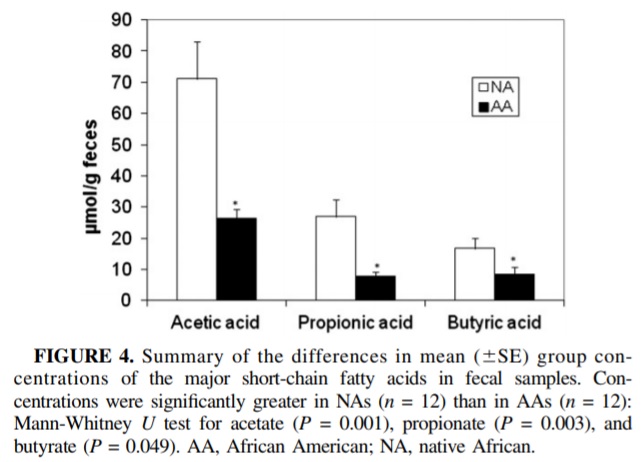 A 2013 study 23 found that African Americans were 50-times more at risk of colon cancer then Native Africans, concluding: “Our results support the hypothesis that colon cancer risk is influenced by the balance between microbial production of health-promoting metabolites such as butyrate and potentially carcinogenic metabolites such as secondary bile acids.“
A 2013 study 23 found that African Americans were 50-times more at risk of colon cancer then Native Africans, concluding: “Our results support the hypothesis that colon cancer risk is influenced by the balance between microbial production of health-promoting metabolites such as butyrate and potentially carcinogenic metabolites such as secondary bile acids.“
The importance of dietary fibre for the production of butyrate (and other SCFA’s such as propionate and acetate) was shown in previous blogs 24 25 , as was the importance of the metabolism of bile acids 26 in relation to alcohol-consumption.
The researchers continued: “In summary, our study supports the hypothesis that colon cancer risk is determined by the interaction between diet and gut microbiota 27 28 and that the higher risk in African Americans could be attributed to their chronically lower consumption of [soluble] fiber and resistant starch [insoluble fibre] and their higher consumption of dietary fat.” Furthermore, “The higher consumption of animal protein is one possible explanation for higher stool pH values in subjects on an omnivorous diet, as proteolytic putrefaction bacteria are able to increase stool pH by producing alkaline metabolites [such as ammonia].” 29
In one of his videos, “Testing Your Diet with Pee & Purple Cabbage” 30 , Dr Greger provides a clear explanation of why it is that we should be looking for purple poo and blue pee, when using his ‘red cabbage water down the loo’ technique!
3. Significant reduction in faecal genotoxicity
What this means is that eating those seven dates for just three weeks resulted in significantly less DNA-damage. This is really important, being that the inside protective walls of the colon are made up of DNA.
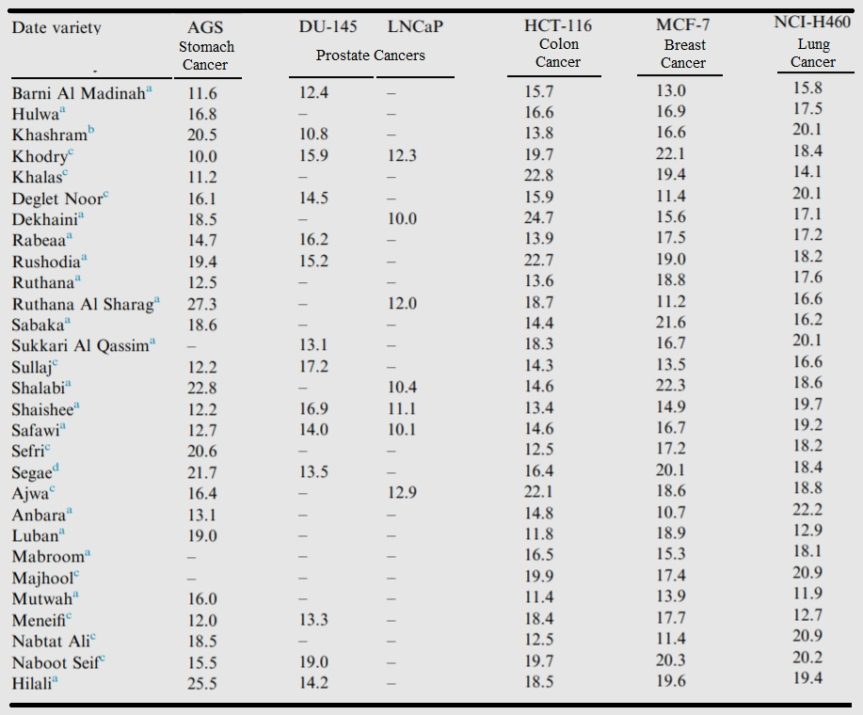
A 2015 study 31 looked in more detail at the the relationship between date-consumption and cancers. They did in vitro testing of whether or not dates (and they used a rather wide-range of different varieties) were able to kill off various cancer cells from common cancers, including:
- stomach cancer
- prostate cancers
- colon cancer
- breast cancer, and
- lung cancer
They concluded: “…extracts from all 29 varieties of date fruits showed that it contained components than can act as reducing agents and free radical scavengers in cellular reactions in vivo…” It’s a well-accepted fact that free radicals are known to cause DNA-damage 32 , and that DNA-damage, in turn, is the major cause of cancer 33 .
“…Similarly, the inhibition of COX enzymes [enzymes responsible for prostanoid-formation] indicated that the extracts contain compounds that can inhibit the production of inflammation causing hormones such as prostaglandins and thromboxanes by preventing the formation of prostaglandin endoperoxide which then leads to the production of inflammatory intermediates…” We’ve seen before 34 how inflammation is responsible for considerable damage within the body – often leading to cancer-formation, and how plant-based diets are anti-inflammatory, while animal-based diets are pro-inflammatory.
“…These results further support the health-benefits of date fruits over and above its nutritional value. The bioassay results also suggest that most varieties of date fruits studied provide similar levels of health benefits.“
This may once again suggests just how interlinked everything is within our bodies, and provides additional support for a wholistic (that deals with the whole body) rather than a reductionist (one that deals with each cell, tissue, organ, or disease as relatively separate and unrelated entities) approach to human nutrition and general health. 35 We’re still relatively ignorant, not only about the true complexity and inter-relatedness of the nutrients we consume, but even about the sum total of nutrients that have not even been identified or named yet.
Naturally, the latter is an in vitro study, and more in vivo research is needed to establish any causal relationship between date-consumption and cancer-prevention/treatment. What was especially interesting in the latter results was that the positive effects were not just on the cancer cells normally coming into direct physical contact with the contents of our gastrointestinal tracts (that is, stomach and colon), but that cancer cells from other organs (prostate, breast and lung) were also killed by the date extract.
Final thoughts
In terms of constipation-avoidance, dates will, of course, only play a small part in alleviating or preventing this unpleasant and potentially dangerous condition. Eating a WFPB diet – including the seven daily dates – will ensure that you’re doing the best for the smooth-running within the plumbing “down there”, as my mother used to say…
Avoiding high levels of saturated fat and animal protein, while filling up on the fibre-rich plant foods, appears to be the way to ensure that what comes out of our bottoms falls on the right side of the pH scale. This is borne out by research 36 37 on plant-based diets and how their gut microbiome was populated by more health-beneficial bacteria species, such as Bifidobacterium and Lactobacillus, when compared with the typical omnivore Western diets. And such ‘good’ bacteria are responsible for releasing organic products such as lactic acid and acetic acid, which decrease pH value. So, once again, it’s the plant foods, including dates, of course, that keep it all above board down below.
If just seven dates a day for three weeks can reduce both free radicals and inflammation, what’s to be lost in making them a daily staple? I simply chop up seven dates and add them to my daily fruity-muesli breakfast – making sure there are no stones accidentally left lurking within, of course.

Finally, you may be interested in having a go at the little quiz below, covering aspects of this blog.
[qsm quiz=15]
References
- Manickavasagan A. “Dates as Potential Substitute for Added Sugar in Food.” Dates: Production, Processing, Food, and Medicinal Values. CRC Press, Boca Raton, FL. 2012;317-321. [↩]
- Rahmani AH, Aly SM, Ali H, Babiker AY, Srikar S, Khan AA. Therapeutic effects of date fruits (Phoenix dactylifera) in the prevention of diseases via modulation of anti-inflammatory, anti-oxidant and anti-tumour activity. Int J Clin Exp Med. 2014;7(3):483-91. [↩]
- Al-Kuran O, Al-Mehaisen L, Bawadi H, Beitawi S, Amarin Z. The effect of late pregnancy consumption of date fruit on labour and delivery. J Obstet Gynaecol. 2011;31(1):29-31. [↩]
- Kordi M, Meybodi FA, Tara F, Nemati M, Shakeri MT. The Effect of Late Pregnancy Consumption of Date Fruit on Cervical Ripening in Nulliparous Women. JMRH. 2014;2:150-156. [↩]
- Khadem N, Sharaphy A, Latifnejad R, Hammod N, Ibrahimzadeh S. Comparing the Efficacy of Dates and Oxytocin in the Management of Postpartum Hemorrhage. Shiraz E Med J. 2007;8(2):64-71. [↩]
- Razali N, Mohd Nahwari SH, Sulaiman S, Hassan J. Date fruit consumption at term: Effect on length of gestation, labour and delivery. J Obstet Gynaecol. 2017;37(5):595-600. [↩]
- Kordi M, Salek Nasiri N, Safarian M, Esmaili H, Shadjuo K. The Effect of Oral Honey- Date Syrup Intake during Labor on Labor Progress of Nulliparous Women. Iranian J Obstetr, Gynecol Infert. 2010;13(2):23-30. [↩]
- Best Food for Late Pregnancy. NutritionFacts.org. Published on Oct 15, 2018 [↩]
- Best Food for Labor & Delivery. Michael Greger M.D. FACLM October 17th, 2018 Volume 44 [↩]
- Fibromyalgia, Probiotics & Gut Microbiota [↩]
- Two Types of Gut Bacteria: Plant Eaters’ & Meat Eaters’ [↩]
- Obstructive Sleep Apnea (OSA) & Gut Microbiota [↩]
- Gut Microbiota & Depression [↩]
- Eid N, Enani S, Walton G, et al. The impact of date palm fruits and their component polyphenols, on gut microbial ecology, bacterial metabolites and colon cancer cell proliferation. J Nutr Sci. 2014;3:e46. [↩]
- Eid N, Osmanova H, Natchez C, et al. Impact of palm date consumption on microbiota growth and large intestinal health: a randomised, controlled, cross-over, human intervention study. Br J Nutr. 2015;114(8):1226-36. [↩]
- Bowel Movements. Nutritionfacts topic summary contributed by Charlie. [↩]
- Asian Pac J Cancer Prev. 2011;12(8):2025-30. Constipation and colorectal cancer risk: the Fukuoka Colorectal Cancer Study. Tashiro N1, Budhathoki S, Ohnaka K, Toyomura K, Kono S, Ueki T, Tanaka M, Kakeji Y, Maehara Y, Okamura T, Ikejiri K, Futami K, Maekawa T, Yasunami Y, Takenaka K, Ichimiya H, Terasaka R. [↩]
- Risk of developing colorectal cancer and benign colorectal neoplasm in patients with chronic constipation. A. Guérin R. Mody B. Fok K. L. Lasch Z. Zhou E. Q. Wu W. Zhou N. J. Talley. First published: 15 May 2014. [↩]
- Alkaline Diet – So What?! [↩]
- Psoriasis & Eczema Cured by Alkaline Diet? Caution: Some Graphic Images [↩]
- J R Thornton. High colonic pH promotes colorectal cancer. Lancet. 1981 May 16;1(8229):1081-3. [↩]
- S L Malhotra. Faecal urobilinogen levels and pH of stools in population groups with different incidence of cancer of the colon, and their possible role in its aetiology. J R Soc Med. 1982 Sep;75(9):709-14. [↩]
- J Ou, F Carbonero, E G Zoetendal, J P Delany, M Wang, K Newton, H R Gaskins, S J O’Keefe. Diet, microbiota, and microbial metabolites in colon cancer risk in rural Africans and African Americans. Am J Clin Nutr. 2013 Jul;98(1):111-20. [↩]
- Butyrate – Why Dietary Fibre is So Important [↩]
- Oat Bran & UC [↩]
- All alcohol in your drinks is ethanol [↩]
- Dethlefsen L, Eckburg PB, Bik EM, Relman DA. Assembly of the human intestinal microbiota. Trends Ecol Evol 2006;21:517–23. [↩]
- O’Keefe SJD. Nutrition and colonic health: the critical role of the microbiota. Curr Opin Gastroenterol 2008;24:51–8. [↩]
- Stool pH & Colon Cancer. Michael Greger M.D. FACLM February 23rd, 2015 Volume 23. [↩]
- Testing Your Diet with Pee & Purple Cabbage [↩]
- Zhang CR, Aldosari SA, Vidyasagar PSPV, Shukla P, Nair MG. Health-benefits of date fruits produced in Saudi Arabia based on in vitro antioxidant, anti-inflammatory and human tumor cell proliferation inhibitory assays. Journal of the Saudi Society of Agricultural Sciences. 2017;16(3):287-293. [↩]
- Free Radic Biol Med. 2002 Jun 1;32(11):1102-15. Free radical-induced damage to DNA: mechanisms and measurement. Dizdaroglu M1, Jaruga P, Birincioglu M, Rodriguez H. [↩]
- ICR: DNA damage and cancer. [↩]
- Where’s the beef? Look for the inflammation. [↩]
- Wholism vs Reductionism – Not Just a War of Words [↩]
- J Zimmer, B Lange, JS Frick, H Sauer, K Zimmermann, et al. A vegan or vegetarian diet substantially alters the human colonic faecal microbiota. Eur J Clin Nutr. 2012 Jan;66(1):53-60. [↩]
- J Maukonen, M Saarela. Human gut microbiota: does diet matter? Proc Nutr Soc. 2015 Feb;74(1):23-36. [↩]
